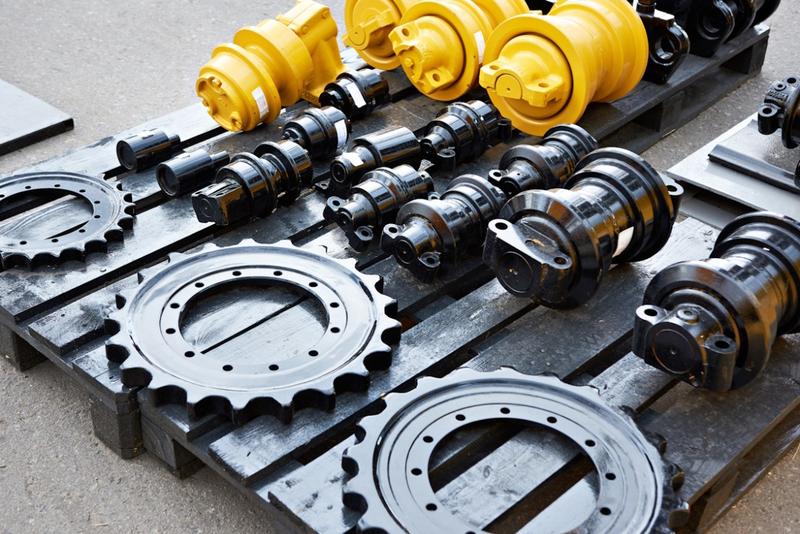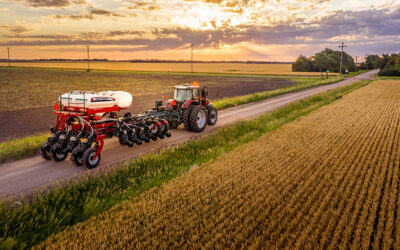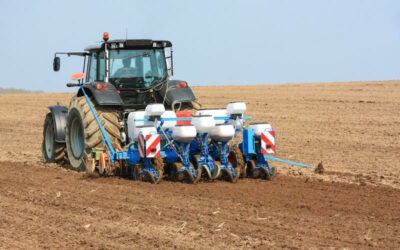1. Begin with a Thorough Pre-Cleaning Inspection
Before you start cleaning, it’s important to inspect your equipment for any damage, leaks, or loose components that could be affected during the cleaning process.
- Check for Leaks and Loose Parts: Look for oil or fluid leaks and ensure all bolts and parts are securely tightened. Cleaning can sometimes reveal underlying issues, so identifying and fixing these before washing can prevent further problems.
- Remove Excess Debris: Use an air compressor or brush to remove loose dirt, dust, and crop residue before washing. This helps avoid clogging hoses and nozzles and makes the overall cleaning process more effective.
- Prioritize Safety: Ensure the equipment is turned off and properly cooled down before cleaning, and disconnect power sources when possible. At Ziegler, we believe every step should Start with Safety to protect both you and your machinery.
2. Clean the Exterior with the Right Tools and Techniques
The exterior surfaces of your equipment need regular cleaning to remove dirt, chemicals, and crop residues that can corrode parts and affect performance.
- Use High-Pressure Water: A pressure washer is highly effective for removing dirt and residue. Use a wide-angle nozzle to avoid damaging sensitive areas and hold the spray at a safe distance from the equipment.
- Apply a Biodegradable Degreaser: For tougher grime, use a degreaser that’s safe for equipment surfaces and the environment. Apply it to areas with heavy buildup, let it sit, and rinse thoroughly.
- Avoid Sensitive Areas: Be cautious around the engine compartment, electronic components, and bearings. Cover these areas if possible or use a gentler spray to prevent water from reaching sensitive parts.
3. Pay Special Attention to the Radiator and Cooling System
The radiator and cooling system play a vital role in your equipment’s performance, and dust or debris buildup can lead to overheating.
- Clear Dust and Debris from the Radiator Fins: Use compressed air to blow out dust and crop residue from the radiator fins. Avoid using high-pressure water directly on the radiator, as it can damage the fins.
- Inspect the Cooling System for Blockages: Make sure fans and other cooling components are free from debris to maintain proper airflow. Keeping these areas clean prevents overheating and helps your engine run smoothly.
- Schedule Regular Maintenance with Ziegler Ag: Our team can provide professional cleaning and maintenance for radiators and cooling systems to keep your equipment in peak condition, especially during peak seasons.
4. Keep Cab and Interior Components Clean
A clean cab enhances operator comfort and improves visibility. Dust and grime inside the cab can interfere with controls, switches, and displays, making it important to clean these areas regularly.
- Wipe Down Surfaces and Controls: Use a soft cloth or microfiber towel to clean the dashboard, controls, and other surfaces. Avoid harsh chemicals that could damage electronic components.
- Vacuum the Floors and Seat: Regular vacuuming prevents dirt and debris from accumulating in the cab. Clean upholstery and floors help maintain a comfortable workspace, especially during long working hours.
- Replace Air Filters Regularly: The cab air filter keeps dust out, but it can become clogged over time. Replace it as part of your regular cleaning routine to maintain good air quality inside the cab.
5. Clean and Lubricate Moving Parts
Cleaning alone isn’t enough for moving parts—they need to be lubricated to reduce friction and prevent wear. After cleaning, make sure to apply fresh lubrication to key components.
- Focus on Grease Points: Check your equipment manual for specific grease points and apply lubricant where needed. This includes joints, bearings, and other areas with metal-on-metal contact.
- Apply Oil to Chains and Linkages: After cleaning, apply oil to chains, linkages, and other exposed parts to protect them from rust and ensure smooth operation.
- Rely on Genuine Parts and Lubricants from Ziegler: Using high-quality lubricants and parts is essential for maintaining equipment longevity. Ziegler Ag offers a full range of genuine products to support your maintenance needs.
6. Conduct a Post-Cleaning Inspection
After cleaning, it’s essential to inspect your equipment again to ensure all parts are functioning correctly and identify any new issues that may have been revealed during the cleaning process.
- Check for Visible Wear or Damage: Inspect all cleaned areas for signs of wear or damage that may need attention before the next use.
- Test Moving Parts and Controls: Make sure that all moving parts and controls operate smoothly and that no areas have been inadvertently loosened or damaged during cleaning.
- Schedule Regular Service with Ziegler Ag: Routine maintenance is crucial for equipment longevity. Our team can provide comprehensive inspections and tune-ups to keep your equipment ready for the field.
Trust Ziegler Ag for Expert Maintenance and Support
At Ziegler Ag, we believe that proper equipment care begins with quality maintenance and a commitment to safety. Our expert service team is here to support you with everything from regular inspections to parts and repairs, ensuring your equipment remains reliable and effective. With over a century of service to farmers, Ziegler Ag is your trusted partner in keeping your equipment running at its best.
For Service and Maintenance Support, Contact Ziegler Ag:
- Explore Our Maintenance Services: Ziegler Ag Services
- Talk to a Ziegler Representative: Call 800-352-2812 to schedule service or get maintenance advice.
- Visit Your Nearest Ziegler Location: Ziegler Locations
With Ziegler Ag, you can Start with Safety and rely on expert support to keep your equipment clean, safe, and ready for the field.






